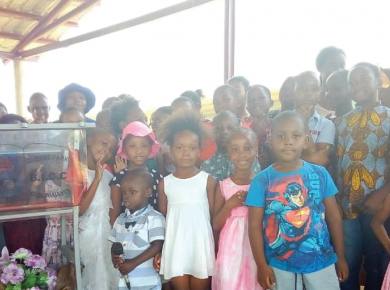Posted: June 12, 2019
In this issue, we have examples of how members of the Anabaptist Mennonite family are making a place for children in their local churches around the world.
The Peace, Integrity and Lifeskills Clubs (PILLS) are values education-based clubs for the Brethren in Christ Church that help learners in 13 pilot junior and high schools with developing mindfulness. They have taken root and developed as an extracurricular, non-formal activity (ENA) in three provinces of Zimbabwe including Bulawayo, Matabeleland South and Matabeleland North.
The Peace, Integrity and Lifeskills (PILLS) program objective is to create a peaceful school climate by addressing teachers, school management and a pilot group of learners.
The opportunity of learner’s time spent at school and the relevance of values education have continued to be mutually leveraged to benefit both curricular and extra-curricular life through moral, cultural, social and spirit-developing education.
In Brethren In Christ Church schools, the 10 core values of the Brethren In Christ Church form the entry-level module.
The most common outcome of peace education has been a reduction in overt bullying. The second outcome is that of increased cooperation and the desire to work together.
The most popular product of this cooperation is a peace club garden.
At a Peace Tree-a-thon for Zimbabwe’s National Tree Planting Day, PILLS practiced creation care, children’s education and peace work together.
This year, the International Day of Peace commemoration was merged with Zimbabwe’s National Tree Planting Day through a Peace Tree-athon planting under the sub-theme “Feed your tree, feed your peace.”
This tag line was crafted to encourage the schools to make it everyone's concern to see that all trees thrive as their commitment to peace with one another.
The Forestry Commission of Zimbabwe declares national trees for each year. This year, jackalberry tree, also known as the African ebony tree, was chosen. Jackalberry trees provide an important source of food for people, wildlife and birds, while also offering a beautiful wood used for household goods and medicine.
Tree planting is set to be a BIC church-wide phenomenon as part of elevating creation care driven by the compassionate ministry's strategy for 2019–2023.
The BICC in Zimbabwe has an estimate 50?000 members. The annual planting of a tree per capita will be significant in time as some communities will need to do more due to deforestation.
—submitted by Sibonokuhle Ncube, national coordinator, Brethren In Christ Compassionate & Development Services Sustainable Peace & Development, Zimbabwe.
This article first appeared in Courier/Correo/Courrier April 2019.

Join the Conversation on Social Media
FacebookTwitterInstagramFlickrYouTube